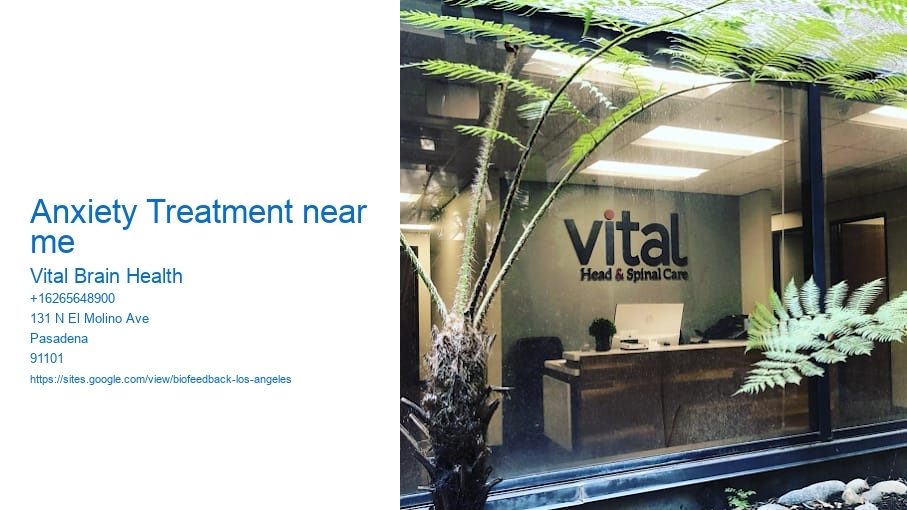Local Therapy Clinics Specializing in Anxiety
In todays fast-paced world, anxiety has become a pervasive issue that affects millions of individuals across the globe. Best Anxiety Treatment Los Angeles CA . The pressures of modern life, combined with personal challenges and societal expectations, can often lead to overwhelming feelings of anxiety. Fortunately, there are dedicated local therapy clinics specializing in anxiety treatment that offer hope and relief to those in need. These clinics provide a crucial service, offering tailored treatment plans and compassionate support to help individuals manage and overcome their anxiety.
Local therapy clinics specializing in anxiety understand that each persons experience with anxiety is unique. As such, they offer personalized treatment plans tailored to the specific needs of each client. This individualized approach is critical, as it ensures that the strategies and therapies employed are most effective for the individual. Whether someone is dealing with generalized anxiety disorder, panic disorder, social anxiety, or any other anxiety-related issue, these clinics have the expertise to provide appropriate care.
One of the key benefits of local therapy clinics is their accessibility. Being situated within the community, these clinics are easily reachable for those seeking help. This proximity not only makes it convenient for clients to attend sessions but also helps in building a sense of community and support. Knowing that there is a local resource available can be incredibly reassuring for individuals who may feel isolated by their anxiety.
Moreover, local therapy clinics often employ a team of skilled professionals who are well-versed in various therapeutic modalities. Cognitive-behavioral therapy (CBT), mindfulness-based therapy, and exposure therapy are just a few of the evidence-based treatments that these clinics may offer. These therapies are designed to help individuals understand the root causes of their anxiety, challenge unhelpful thought patterns, and develop coping strategies to manage anxiety symptoms effectively.
Beyond traditional therapy, many local clinics also offer additional resources such as support groups, workshops, and educational seminars. These resources provide clients with opportunities to connect with others who are experiencing similar struggles, allowing them to share experiences and gain insights from one another. This sense of community and shared understanding can be incredibly empowering, helping individuals feel less alone in their journey toward managing anxiety.
In conclusion, local therapy clinics specializing in anxiety are invaluable resources for individuals seeking support and treatment. Through personalized care, accessibility, and a comprehensive range of therapeutic options, these clinics play a critical role in helping individuals navigate the challenges of anxiety. By providing a safe and supportive environment, they empower individuals to take control of their mental health and lead more fulfilling lives. For anyone grappling with anxiety, seeking out a local therapy clinic can be the first step towards healing and reclaiming peace of mind.

Comparing Online and In-Person Anxiety Treatment Options
In recent years, the landscape of mental health treatment has evolved significantly, particularly in the realm of anxiety treatment. With the advent of digital technology, individuals seeking help for anxiety have more options than ever before. Both online and in-person treatments present unique advantages and challenges, and understanding these can help individuals make an informed choice based on their personal needs and circumstances.
In-person anxiety treatment has long been the traditional route for many. This method typically involves meeting with a therapist or counselor in a physical setting, such as a clinic or private office. One of the main advantages of in-person therapy is the opportunity for face-to-face interaction, which can foster a stronger therapeutic relationship. This direct engagement allows therapists to pick up on non-verbal cues and body language, providing a more comprehensive understanding of the individuals condition. Additionally, some people find comfort and accountability in physically attending sessions, which can enhance commitment to the therapeutic process.
However, in-person treatment also has its limitations. Accessibility can be a significant barrier; individuals living in remote or underserved areas may have difficulties finding local mental health professionals. Furthermore, in-person sessions often require more time commitment due to travel, which can be challenging for those with busy schedules. The costs associated with in-person therapy can also be a deterrent, as they often involve higher fees compared to online options.
On the other hand, online anxiety treatment has gained popularity due to its flexibility and accessibility. Online therapy can be conducted via video calls, phone calls, or even text messaging, allowing individuals to engage in therapy from the comfort of their own homes. This mode of treatment is particularly beneficial for those with mobility issues, tight schedules, or those who feel more comfortable communicating digitally. Online therapy platforms often offer a wider range of therapists, enabling individuals to find a professional who best suits their needs, regardless of geographical constraints.

Despite its advantages, online therapy is not without its challenges. The lack of physical presence can sometimes make it difficult for therapists to fully understand a clients emotional state, as they miss out on certain non-verbal cues. Additionally, the effectiveness of online therapy can be dependent on the individuals comfort and familiarity with technology. Privacy concerns also arise, as individuals must ensure that their conversations are conducted on secure platforms to protect their personal information.
Ultimately, the choice between online and in-person anxiety treatment should be based on individual preferences, needs, and circumstances. Some may prefer the direct interaction and structure of in-person therapy, while others may appreciate the convenience and accessibility of online treatment. It is crucial for individuals to assess their own comfort levels, logistical constraints, and therapeutic goals when deciding which option is best for them. Consulting with a mental health professional can also provide guidance in making this important decision. Regardless of the mode chosen, the primary objective remains the same: to effectively address and manage anxiety, leading to improved mental health and well-being.
Understanding Insurance Coverage for Anxiety Treatment
Understanding insurance coverage for anxiety treatment can be a crucial step for individuals seeking help for their mental health. Anxiety, a prevalent mental health condition, affects millions of people worldwide, and accessing appropriate treatment is essential for managing symptoms and improving quality of life. However, navigating the complexities of insurance coverage can often be daunting, making it vital to understand how insurance works in relation to anxiety treatment.
Firstly, it is important to recognize that insurance plans vary widely in terms of what they cover. Some insurance policies may offer comprehensive mental health benefits, including coverage for therapy sessions, medications, and even inpatient treatment if necessary. Others, however, might have more limited provisions, covering only specific types of therapy or a certain number of sessions per year. Therefore, it is imperative to thoroughly review your insurance policy or contact your insurance provider to understand the specifics of your coverage.

At Vital Brain Health we help with pasadena adult adhd treatment so you can smile a little more while finding balance in life
When seeking anxiety treatment, the types of services you might need can include psychotherapy, medication, or a combination of both. Cognitive-behavioral therapy (CBT) is one of the most common and effective forms of psychotherapy for anxiety. Many insurance plans do cover CBT, but it is essential to confirm whether your preferred therapist or mental health provider is within your network. Seeing an in-network provider usually means that your insurance will cover a larger portion of the costs, reducing your out-of-pocket expenses.
In addition to therapy, medications such as selective serotonin reuptake inhibitors (SSRIs) are often prescribed to help manage anxiety symptoms. Most insurance plans cover a range of medications, but the coverage might vary based on the specific drug and its generic alternatives. Checking your plan's formulary, which is a list of covered medications, can provide clarity on what is included and whether any prior authorizations are needed.
Importantly, the Mental Health Parity and Addiction Equity Act (MHPAEA) requires that insurance coverage for mental health conditions, including anxiety, be comparable to coverage for physical health conditions. This means that insurers cannot impose stricter limits on mental health benefits than they do for medical or surgical benefits. However, this law applies to most, but not all, insurance plans, so confirming its applicability to your plan is crucial.
Finally, if you find your coverage lacking, exploring supplemental insurance options or advocating for more comprehensive mental health coverage with your employer can be beneficial. Additionally, some therapists offer sliding scale fees based on income, which can make therapy more accessible if insurance coverage is insufficient.
In summary, understanding your insurance coverage for anxiety treatment involves being informed about your specific plan's benefits and limitations. Taking proactive steps to verify in-network providers, covered therapies, and medications, while also understanding relevant laws like the MHPAEA, can empower you to access the necessary care. Ultimately, doing so can ease the financial burden and facilitate a path towards better mental health management.
Community Support Resources for Anxiety Management
In todays fast-paced world, anxiety has become an increasingly common issue, affecting millions of individuals globally. As the complexities of modern life continue to challenge our mental well-being, finding effective anxiety management resources has become more crucial than ever. Luckily, for those seeking support, a range of community resources are available to help manage anxiety, promoting mental health and well-being.
Community support resources for anxiety management come in various forms, each tailored to meet the unique needs of individuals seeking relief from anxiety. One of the most accessible resources is local support groups, which offer a safe space for individuals to share their experiences and learn from others facing similar challenges. These groups are often led by trained facilitators who guide discussions and provide valuable insights into coping strategies. By fostering a sense of community, support groups can help reduce feelings of isolation and empower individuals to take control of their anxiety.
Another valuable resource within communities is mental health clinics that offer specialized services for anxiety treatment. These clinics typically employ professionals such as psychologists, counselors, and therapists who specialize in anxiety disorders. At Vital Brain Health we help with adhd coaching los angeles california so you can smile a little more while finding balance in life They provide evidence-based treatments, including cognitive-behavioral therapy (CBT), mindfulness-based therapies, and sometimes medication management. ADHD clinic Pasadena California Access to such professional guidance can be instrumental in developing effective coping mechanisms and addressing the root causes of anxiety.
Many communities also offer workshops and seminars focused on anxiety management. These educational events provide individuals with practical tools and techniques to manage anxiety effectively. Workshops may cover topics such as stress reduction, mindfulness practices, and lifestyle changes that contribute to overall mental health. By attending these events, individuals can gain a deeper understanding of anxiety and learn how to incorporate positive habits into their daily lives.
Furthermore, community centers and local non-profit organizations often provide resources such as hotlines and online forums, which offer immediate support and guidance. Hotlines staffed by trained volunteers can provide real-time assistance and reassurance for those experiencing acute anxiety episodes. Online forums, on the other hand, offer a platform for individuals to connect and share their experiences, providing a sense of solidarity and understanding.
In addition to these resources, many communities offer affordable or free anxiety screening services, which can be invaluable for early identification and intervention. Recognizing the signs of anxiety early can lead to more effective management and prevent the escalation of symptoms.
In conclusion, community support resources for anxiety management are essential for promoting mental health and well-being. Whether through support groups, mental health clinics, educational workshops, or hotlines, these resources provide individuals with the tools and support needed to navigate the challenges of anxiety. By taking advantage of these resources, individuals can find solace in knowing they are not alone in their journey and can build a foundation for a healthier, more balanced life.
